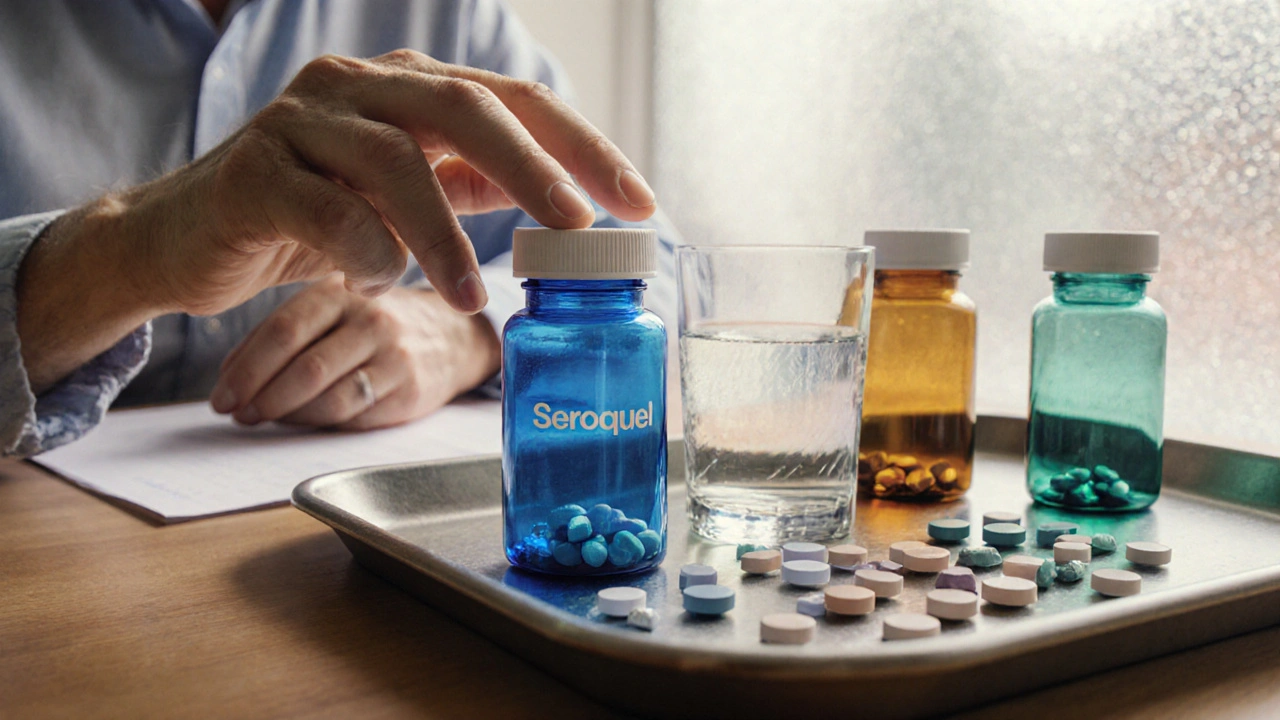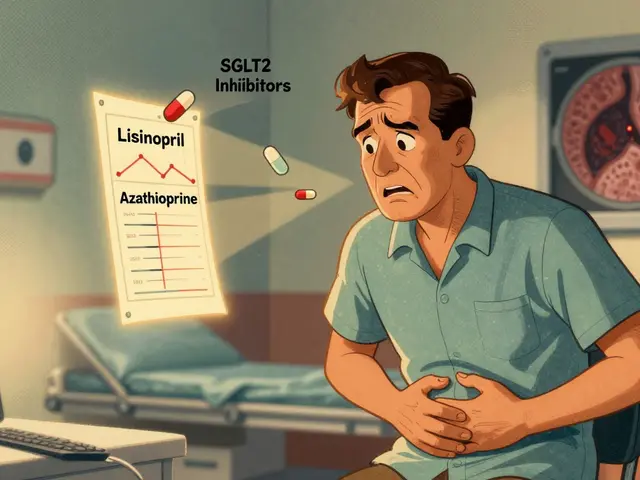Seroquel vs Alternatives: Which Antipsychotic Fits You Best
Antipsychotic Decision Helper
Your Priority:
Select your priority to see recommendations
Top Recommendation:
Results will appear here
Why This Choice:
Details will appear here
Detailed Analysis
When you or a loved one need a mood‑stabilizing or antipsychotic medication, the choice can feel overwhelming. Seroquel (Quetiapine) is a second‑generation antipsychotic often prescribed for schizophrenia, bipolar disorder, and major depressive disorder. It works by balancing dopamine and serotonin activity in the brain, easing psychotic symptoms and mood swings.
Key Takeaways
- Seroquel is effective for a wide range of conditions but can cause sedation and metabolic changes.
- Aripiprazole (Abilify) offers a lower risk of weight gain but may trigger anxiety.
- Risperidone (Risperdal) is fast‑acting, good for acute psychosis, yet can raise prolactin levels.
- Olanzapine (Zyprexa) often works well for severe symptoms but has the highest weight‑gain potential.
- Ziprasidone (Geodon) has a favorable metabolic profile but requires strict dosing with meals.
How Seroquel Stacks Up - Core Attributes
Before we compare, let’s break down what matters most in an antipsychotic:
- Indications: What diagnoses does the drug treat?
- Onset of action: How quickly do you notice symptom relief?
- Side‑effect profile: Sedation, weight gain, metabolic changes, movement disorders, etc.
- Dosing flexibility: Available in immediate‑release (IR) and extended‑release (XR) forms.
- Drug interactions: Especially with CYP3A4 inhibitors or inducers.
Head‑to‑Head Comparison Table
| Drug | Primary Uses | Typical Onset | Key Side‑effects | Weight Impact | Metabolic Risk |
|---|---|---|---|---|---|
| Seroquel | Schizophrenia, Bipolar I/II, Adjunct MDD | 1‑2 weeks (full effect 4‑6 weeks) | Sedation, orthostatic hypotension, dry mouth | Moderate (average +3‑5kg) | Medium (↑ glucose, lipids) |
| Aripiprazole | Schizophrenia, Bipolar, MDD adjunct | 1‑2 weeks | Akathisia, insomnia, nausea | Low (±0kg) | Low |
| Risperidone | Schizophrenia, Acute mania | 3‑5 days | Prolactin elevation, EPS | Low‑moderate (+1‑3kg) | Low‑medium |
| Olanzapine | Schizophrenia, Bipolar I | 1‑2 weeks | Heavy sedation, anticholinergic effects | High (+7‑10kg) | High (significant glucose & lipid rise) |
| Ziprasidone | Schizophrenia, Acute bipolar | 5‑7 days | QTc prolongation, nausea | Low (±0kg) | Low |
When Seroquel Might Be Your Best Bet
If you need a medication that covers both psychosis and mood symptoms, Seroquel’s broad label can spare you from juggling multiple drugs. Its XR formulation offers once‑daily dosing, which many patients find easier to stick with. The sedation can actually be a blessing if you struggle with insomnia.
However, if you’re already battling obesity, diabetes, or high cholesterol, the moderate weight and metabolic impact may push you toward a lighter option like Aripiprazole or Ziprasidone.
Alternatives in Detail
Aripiprazole (Abilify)
Aripiprazole is known as a “partial dopamine agonist.” In plain terms, it stabilizes dopamine without fully blocking it, which reduces the chance of gaining weight. It’s a go‑to when patients can’t tolerate the drowsiness Seroquel brings. The flip side? Some experience restless legs or feeling jittery, especially at higher doses.
Risperidone (Risperdal)
Risperidone kicks in fast, making it useful for acute psychotic breaks. Its side‑effect roster includes elevated prolactin, which can lead to menstrual changes or breast enlargement in men. If you’re okay with regular blood‑work monitoring, Risperidone can be a solid, cost‑effective choice.
Olanzapine (Zyprexa)
Olanzapine packs a punch for severe symptoms but carries the highest risk of weight gain and metabolic syndrome. Many clinicians reserve it for patients who haven’t responded to lighter agents. The trade‑off is you’ll need diet counseling and frequent labs.
Ziprasidone (Geodon)
Ziprasidone’s biggest draw is its low impact on weight and glucose. The catch? It must be taken with a full meal (≥350kcal) to be absorbed properly. If you miss meals, you risk sub‑therapeutic levels and relapse.
Decision Checklist - Which Drug Aligns With Your Priorities?
- Priority: Sleep - Choose Seroquel or Olanzapine.
- Priority: Minimal weight gain - Choose Aripiprazole, Ziprasidone.
- Priority: Rapid control of acute psychosis - Choose Risperidone or Olanzapine.
- Priority: Low cardiac risk - Avoid Ziprasidone if you have a history of QTc prolongation.
- Priority: Simple dosing - Seroquel XR or Aripiprazole once daily.

Common Pitfalls and How to Dodge Them
Pitfall 1: Assuming “one‑size‑fits‑all.” Antipsychotics act differently based on genetics, age, and comorbidities. Always discuss blood work and symptom tracking with your prescriber.
Pitfall 2: Ignoring drug‑drug interactions. Many antipsychotics are metabolized by CYP3A4; grapefruit juice or certain antibiotics can raise levels unexpectedly.
Pitfall 3: Stopping medication abruptly. Sudden discontinuation can cause rebound psychosis or withdrawal dysphoria. Taper slowly under medical supervision.
Next Steps - Talk to Your Provider
Grab a notebook and write down the following before your next appointment:
- Current symptoms (e.g., insomnia, agitation, mood swings).
- Any ongoing health issues (diabetes, heart disease, weight concerns).
- Medications you’re already taking, including over‑the‑counter supplements.
- Your lifestyle preferences (once‑daily dosing, meals timing).
Bring this list to your psychiatrist or primary care clinician. Use the comparison table as a visual aid to ask, “Would switching to X reduce my risk of Y?” The right conversation can land you on a treatment that matches both effectiveness and tolerability.
Frequently Asked Questions
Is Seroquel safe for seniors?
Seroquel can be used in older adults but the dose is usually started low (e.g., 25mg at night) and titrated slowly. Sedation and orthostatic hypotension are more common in this group, so monitoring blood pressure and fall risk is essential.
Can I switch from Seroquel to Aripiprazole without a washout period?
Because both drugs affect dopamine pathways, a direct cross‑taper is often recommended rather than a sudden switch. Your doctor may reduce Seroquel by 25mg every few days while simultaneously introducing a low dose of Aripiprazole.
Which antipsychotic has the lowest risk of diabetes?
Aripiprazole and Ziprasidone consistently show the lowest impact on glucose metabolism in clinical studies. If diabetes is a major concern, they are usually the first alternatives considered.
Do any of these drugs cause sexual dysfunction?
Risperidone can raise prolactin, leading to decreased libido or erectile issues. Olanzapine and Seroquel have milder hormonal effects, but sedation can indirectly lower sexual desire.
What should I do if I gain weight on Seroquel?
First, talk to your prescriber. They might lower the dose, switch to a different agent, or add a lifestyle plan. Regular exercise, a high‑protein diet, and monitoring blood sugar can mitigate some of the metabolic effects.







9 Comments
Kenneth Obukwelu
October 10, 2025 at 18:35
Picture yourself at a crossroads where sedation meets metabolic caution; Seroquel stands tall, offering a soothing night’s sleep while whispering of possible weight gain. In the grand theatre of psychopharmacology, this drug plays both the gentle lullaby and the stern guardian of dopamine and serotonin. Its broad label can spare you from juggling multiple prescriptions, a boon for those who cherish simplicity. Yet, the very sedation that lulls you may also tether you to a slower morning rise, a trade‑off worth contemplating. Remember, elder patients often feel the sway of orthostatic drops, demanding a cautious titration. In the end, the choice is a dialogue between your body’s whispers and the physician’s guidance.
Josephine hellen
October 27, 2025 at 03:11
When you sit down with the comparison chart, you quickly realize how many factors compete for your attention.
The allure of a medication that promises both calm nights and stable moods is understandable.
Yet the sedative veil of Seroquel can sometimes mask underlying metabolic turbulence.
Weight gain, while a modest number on paper, translates into real‑world struggles for patients already wrestling with diabetes.
On the other hand, Aripiprazole steps lightly on the scale, presenting a near‑neutral weight profile.
Its partial dopamine agonism can feel like a gentle nudge rather than a blunt push, which some patients find less unsettling.
Risperidone impresses with a swifter onset, often within days, making it a go‑to for acute psychotic eruptions.
However, the hormonal ripple of elevated prolactin should not be dismissed lightly, especially for those sensitive to endocrine shifts.
Olanzapine, the heavyweight champion of efficacy, brings a price tag of significant metabolic risk that demands vigilant monitoring.
Ziprasidone’s low‑weight footprint is attractive, but the culinary requirement of a substantial meal can become a practical hurdle.
If you consider cardiac safety, the QTc shadow behind Ziprasidone casts doubt for anyone with a history of prolongation.
Meanwhile, Seroquel XR’s once‑daily convenience aligns well with a lifestyle that craves simplicity.
The real art lies in matching these pharmacologic personalities to the patient’s unique biography.
A thorough conversation about sleep patterns, dietary habits, and cardiovascular history can illuminate the path.
Remember that drug‑drug interactions linger in the background, especially with CYP3A4 modulators.
Ultimately, the best choice is the one that balances therapeutic gain with tolerable side‑effects, guided by shared decision‑making.
Ria M
November 12, 2025 at 12:47
In the grand tapestry of mental health, each antipsychotic is a thread woven with intent and consequence. Seroquel, with its dual‑action, offers a calm that can soothe restless nights, yet its metabolic imprint may scar the canvas of the body. Aripiprazole, the restless spirit, dances lightly, sparing weight but sometimes stirring inner agitation. Risperidone bursts onto the scene like a swift tide, controlling psychosis with speed, though it may raise the hormonal seas. Choose the thread that harmonizes with the pattern of your lived experience, lest the fabric fray.
Michelle Tran
November 28, 2025 at 22:23
Totally agree! 😴
Caleb Ferguson
December 15, 2025 at 07:59
From a pharmacology standpoint, Seroquel’s half‑life allows flexible dosing, but monitoring fasting glucose is prudent. Aripiprazole’s minimal weight impact makes it suitable for patients with metabolic syndrome. Risperidone’s rapid onset is valuable in acute settings, though prolactin checks are recommended. Olanzapine should be reserved for refractory cases due to its high metabolic burden.
Delilah Jones
December 31, 2025 at 17:35
The simplest dosing schedule often wins adherence; Seroquel XR shines here. If you can tolerate the sedation, it’s a solid all‑rounder.
Pastor Ken Kook
January 17, 2026 at 03:11
Wow, that long‑winded breakdown really paints the picture! 😊
It reminds me that every medication carries a story, not just a side‑effect list.
Balancing sleep and weight is like walking a tightrope, and the right pole can make all the difference.
Doctors and patients alike should treat this decision as a partnership, not a prescription.
Keep the conversation alive, and the best fit will emerge.
Jennifer Harris
February 2, 2026 at 12:47
I appreciate the emphasis on shared decision‑making; it empowers patients to voice their priorities. Monitoring metabolic markers when starting Seroquel is a wise precaution. A clear plan for tapering, if needed, can prevent rebound symptoms.
Northern Lass
February 18, 2026 at 22:23
While the exposition is thorough, one must not overlook the epistemic bias inherent in pharmaceutical marketing. The presentation of Seroquel as a panacea subtly disregards its proclivity for inducing iatrogenic metabolic derangements. A more scrupulous analysis would foreground the long‑term cardiovascular ramifications, especially in populations predisposed to such ailments. Moreover, the reliance on comparative tables often masks the nuanced pharmacogenomic variability among patients. Therefore, any recommendation must be contextualized within a framework of critical appraisal rather than mere convenience.